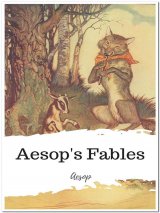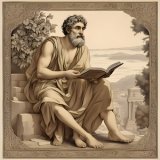Aesop's Fables Page #22
Aesop's Fables, or the Aesopica, is a collection of fables credited to Aesop, a slave and storyteller believed to have lived in ancient Greece between 620 and 564 BCE.
THE PIG AND THE SHEEP A Pig found his way into a meadow where a flock of Sheep were grazing. The shepherd caught him, and was proceeding to carry him off to the butcher's when he set up a loud squealing and struggled to get free. The Sheep rebuked him for making such a to-do, and said to him, "The shepherd catches us regularly and drags us off just like that, and we don't make any fuss." "No, I dare say not," replied the Pig, "but my case and yours are altogether different: he only wants you for wool, but he wants me for bacon." THE GARDENER AND HIS DOG A Gardner's Dog fell into a deep well, from which his master used to draw water for the plants in his garden with a rope and a bucket. Failing to get the Dog out by means of these, the Gardener went down into the well himself in order to fetch him up. But the Dog thought he had come to make sure of drowning him; so he bit his master as soon as he came within reach, and hurt him a good deal, with the result that he left the Dog to his fate and climbed out of the well, remarking, "It serves me quite right for trying to save so determined a suicide." THE RIVERS AND THE SEA Once upon a time all the Rivers combined to protest against the action of the Sea in making their waters salt. "When we come to you," said they to the Sea, "we are sweet and drinkable: but when once we have mingled with you, our waters become as briny and unpalatable as your own." The Sea replied shortly, "Keep away from me and you'll remain sweet." THE LION IN LOVE A Lion fell deeply in love with the daughter of a cottager and wanted to marry her; but her father was unwilling to give her to so fearsome a husband, and yet didn't want to offend the Lion; so he hit upon the following expedient. He went to the Lion and said, "I think you will make a very good husband for my daughter: but I cannot consent to your union unless you let me draw your teeth and pare your nails, for my daughter is terribly afraid of them." The Lion was so much in love that he readily agreed that this should be done. When once, however, he was thus disarmed, the Cottager was afraid of him no longer, but drove him away with his club. THE BEE-KEEPER A Thief found his way into an apiary when the Bee-keeper was away, and stole all the honey. When the Keeper returned and found the hives empty, he was very much upset and stood staring at them for some time. Before long the bees came back from gathering honey, and, finding their hives overturned and the Keeper standing by, they made for him with their stings. At this he fell into a passion and cried, "You ungrateful scoundrels, you let the thief who stole my honey get off scot-free, and then you go and sting me who have always taken such care of you!" When you hit back make sure you have got the right man. THE WOLF AND THE HORSE A Wolf on his rambles came to a field of oats, but, not being able to eat them, he was passing on his way when a Horse came along. "Look," said the Wolf, "here's a fine field of oats. For your sake I have left it untouched, and I shall greatly enjoy the sound of your teeth munching the ripe grain." But the Horse replied, "If wolves could eat oats, my fine friend, you would hardly have indulged your ears at the cost of your belly." There is no virtue in giving to others what is useless to oneself. THE BAT, THE BRAMBLE, AND THE SEAGULL A Bat, a Bramble, and a Seagull went into partnership and determined to go on a trading voyage together. The Bat borrowed a sum of money for his venture; the Bramble laid in a stock of clothes of various kinds; and the Seagull took a quantity of lead: and so they set out. By and by a great storm came on, and their boat with all the cargo went to the bottom, but the three travellers managed to reach land. Ever since then the Seagull flies to and fro over the sea, and every now and then dives below the surface, looking for the lead he's lost; while the Bat is so afraid of meeting his creditors that he hides away by day and only comes out at night to feed; and the Bramble catches hold of the clothes of every one who passes by, hoping some day to recognise and recover the lost garments. All men are more concerned to recover what they lose than to acquire what they lack. THE DOG AND THE WOLF A Dog was lying in the sun before a farmyard gate when a Wolf pounced upon him and was just going to eat him up; but he begged for his life and said, "You see how thin I am and what a wretched meal I should make you now: but if you will only wait a few days my master is going to give a feast. All the rich scraps and pickings will fall to me and I shall get nice and fat: then will be the time for you to eat me." The Wolf thought this was a very good plan and went away. Some time afterwards he came to the farmyard again, and found the Dog lying out of reach on the stable roof. "Come down," he called, "and be eaten: you remember our agreement?" But the Dog said coolly, "My friend, if ever you catch me lying down by the gate there again, don't you wait for any feast." Once bitten, twice shy. THE WASP AND THE SNAKE A Wasp settled on the head of a Snake, and not only stung him several times, but clung obstinately to the head of his victim. Maddened with pain the Snake tried every means he could think of to get rid of the creature, but without success. At last he became desperate, and crying, "Kill you I will, even at the cost of my own life," he laid his head with the Wasp on it under the wheel of a passing waggon, and they both perished together. THE EAGLE AND THE BEETLE An Eagle was chasing a hare, which was running for dear life and was at her wits' end to know where to turn for help. Presently she espied a Beetle, and begged it to aid her. So when the Eagle came up the Beetle warned her not to touch the hare, which was under its protection. But the Eagle never noticed the Beetle because it was so small, seized the hare and ate her up. The Beetle never forgot this, and used to keep an eye on the Eagle's nest, and whenever the Eagle laid an egg it climbed up and rolled it out of the nest and broke it. At last the Eagle got so worried over the loss of her eggs that she went up to Jupiter, who is the special protector of Eagles, and begged him to give her a safe place to nest in: so he let her lay her eggs in his lap. But the Beetle noticed this and made a ball of dirt the size of an Eagle's egg, and flew up and deposited it in Jupiter's lap. When Jupiter saw the dirt, he stood up to shake it out of his robe, and, forgetting about the eggs, he shook them out too, and they were broken just as before. Ever since then, they say, Eagles never lay their eggs at the season when Beetles are about. The weak will sometimes find ways to avenge an insult, even upon the strong. THE FOWLER AND THE LARK A Fowler was setting his nets for little birds when a Lark came up to him and asked him what he was doing. "I am engaged in founding a city," said he, and with that he withdrew to a short distance and concealed himself. The Lark examined the nets with great curiosity, and presently, catching sight of the bait, hopped on to them in order to secure it, and became entangled in the meshes. The Fowler then ran up quickly and captured her. "What a fool I was!" said she: "but at any rate, if that's the kind of city you are founding, it'll be a long time before you find fools enough to fill it."
Translation
Translate and read this book in other languages:
Select another language:
- - Select -
- 简体中文 (Chinese - Simplified)
- 繁體中文 (Chinese - Traditional)
- Español (Spanish)
- Esperanto (Esperanto)
- 日本語 (Japanese)
- Português (Portuguese)
- Deutsch (German)
- العربية (Arabic)
- Français (French)
- Русский (Russian)
- ಕನ್ನಡ (Kannada)
- 한국어 (Korean)
- עברית (Hebrew)
- Gaeilge (Irish)
- Українська (Ukrainian)
- اردو (Urdu)
- Magyar (Hungarian)
- मानक हिन्दी (Hindi)
- Indonesia (Indonesian)
- Italiano (Italian)
- தமிழ் (Tamil)
- Türkçe (Turkish)
- తెలుగు (Telugu)
- ภาษาไทย (Thai)
- Tiếng Việt (Vietnamese)
- Čeština (Czech)
- Polski (Polish)
- Bahasa Indonesia (Indonesian)
- Românește (Romanian)
- Nederlands (Dutch)
- Ελληνικά (Greek)
- Latinum (Latin)
- Svenska (Swedish)
- Dansk (Danish)
- Suomi (Finnish)
- فارسی (Persian)
- ייִדיש (Yiddish)
- հայերեն (Armenian)
- Norsk (Norwegian)
- English (English)
Citation
Use the citation below to add this book to your bibliography:
Style:MLAChicagoAPA
"Aesop's Fables Books." Literature.com. STANDS4 LLC, 2025. Web. 11 Jan. 2025. <https://www.literature.com/book/aesop%27s_fables_316>.




Discuss this Aesop's Fables book with the community:
Report Comment
We're doing our best to make sure our content is useful, accurate and safe.
If by any chance you spot an inappropriate comment while navigating through our website please use this form to let us know, and we'll take care of it shortly.
Attachment
You need to be logged in to favorite.
Log In